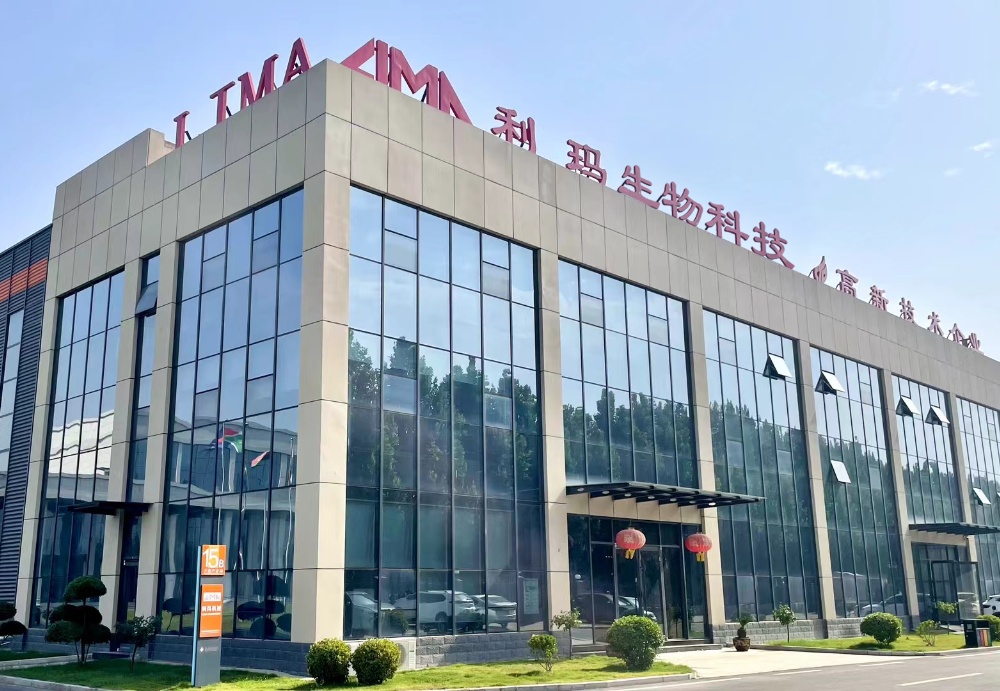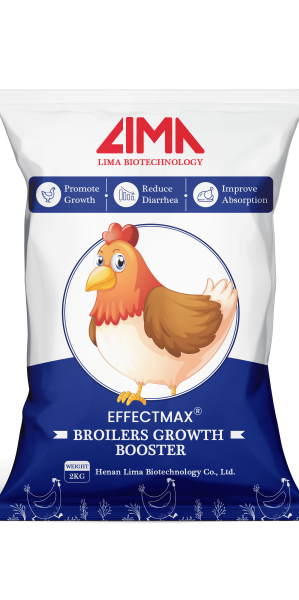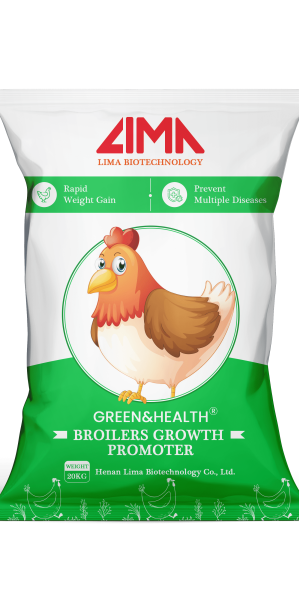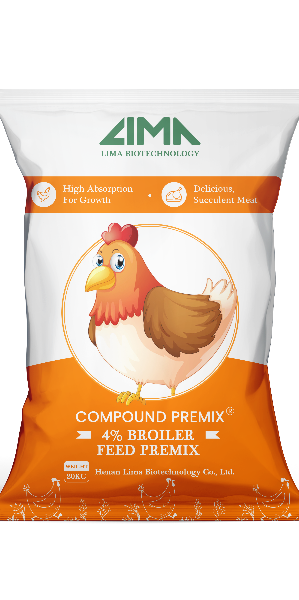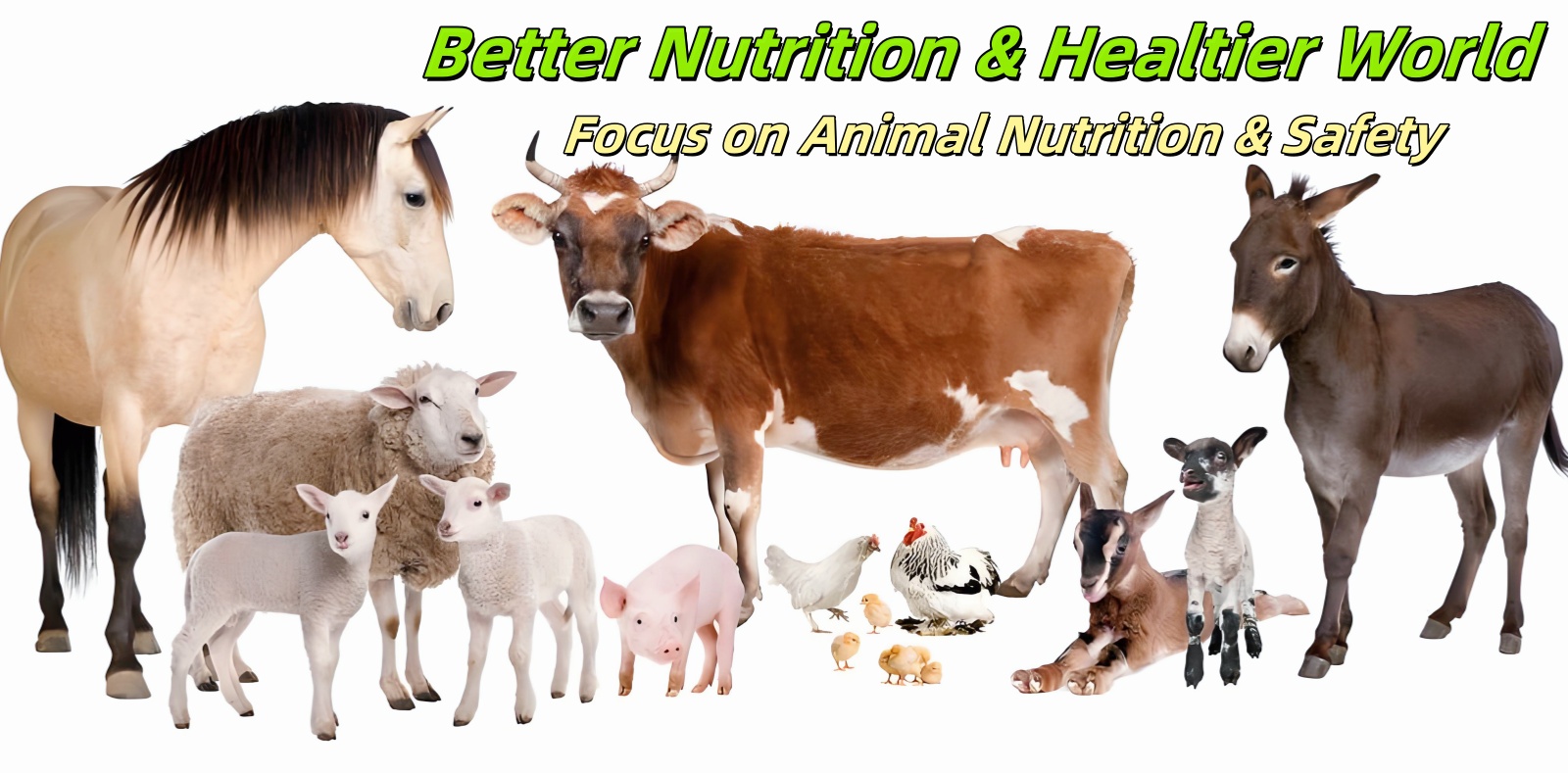The broiler industry plays a pivotal role in Kenya's agricultural economy, providing a rich source of protein for the local market while creating employment opportunities and economic income for numerous farmers. With population growth and rising consumer demand, the development potential of the broiler industry is increasingly evident.
For local farmers, promoting broiler growth is of utmost importance. Faster growth rates mean that broiler chickens can be brought to market in a shorter timeframe, thereby improving farming efficiency, increasing economic returns, and better meeting market demand for chicken meat.
The key factors influencing broiler chicken growth primarily include nutrition, environment, and management. Adequate nutritional supply forms the foundation for broiler chicken growth, suitable environmental conditions provide optimal growth space, and scientific management ensures that all growth conditions are effectively implemented.
Understanding the Growth of Broilers in Kenya
In Kenya, the typical growth pattern of broiler chickens usually exhibits stage-specific characteristics. During the chick stage, growth rates are relatively slow, primarily focused on the development of various organs. Upon entering the juvenile stage, growth rates gradually accelerate, with body weight increasing rapidly. By the adult stage, growth rates slow down again until the chickens reach market weight.
Environmental factors in Kenya significantly influence broiler chicken growth. Climate-wise, high temperatures and humidity can lead to heat stress in broiler chickens, affecting their appetite and growth rate; cold weather, on the other hand, causes broiler chickens to consume more energy to maintain body temperature, which is also detrimental to growth. In terms of feed, the quality, type, and quantity of feed directly impact whether broiler chickens can obtain adequate nutrition. While local feed resources are abundant, some feeds lack balanced nutritional components, which may affect broiler chicken growth. Housing conditions are also critical; overcrowded, poorly ventilated chicken coops can degrade air quality, increase the risk of disease transmission, and thereby impact broiler chicken growth.
In the market, the weight gain of broiler chickens is of great significance. Generally, broiler chickens that meet weight standards are more popular in the market and can command higher prices. Additionally, weight gain is one of the key indicators for evaluating the economic efficiency of broiler chicken farming. Farmers can adjust their farming strategies based on the weight gain of broiler chickens to maximize economic benefits.
Key Benefits of Broiler Growth Promoters
Broiler growth promoters are substances or products that enhance the growth performance of broilers. In Kenya's farming environment, they are particularly important. Due to the inconsistent quality of local feed, growth promoters can compensate for nutritional deficiencies in feed and improve feed utilization; simultaneously, in the face of disease and environmental stress, growth promoters can enhance the immune system of broilers, reduce growth impediments, and assist farmers in addressing various adverse factors.
The types of growth promoters commonly used in poultry farming in Kenya are diverse. Antibiotic-based promoters can help prevent intestinal diseases and promote broiler growth to some extent, but they must be used strictly in accordance with regulations to avoid antibiotic resistance issues; probiotics and prebiotics are also widely used, as they help regulate the intestinal microbiota balance of broilers and improve digestive absorption capacity;
Additionally, there are enzyme preparations that help break down complex nutrients in feed, making them easier for broiler chickens to absorb and utilize. Sammy, a poultry farmer in Mombasa, previously experienced frequent intestinal issues in his broiler chickens, which hindered their growth. After using probiotic growth promoters, intestinal diseases decreased, and the growth rate of the broiler chickens improved significantly.
What Are The Main Components of Broiler Growth Promoters
Broiler growth promoters are typically formulated with the objectives of improving nutrient absorption, enhancing physiological functions, and reducing health risks. While product formulations vary significantly, the core components can be categorized into the following types:
Nutritional Supplement Components
These components directly provide essential nutrients for broiler growth, compensating for any deficiencies in feed and promoting growth and development.
- Amino acids: such as lysine, methionine, and threonine, which are key raw materials for protein synthesis, improve feed protein utilization, and reduce growth retardation.
- Vitamins: including vitamin A (promotes bone development), vitamin D (calcium absorption), and B vitamins (energy metabolism), among others. Deficiencies can lead to growth stagnation.
- Minerals: such as calcium, phosphorus (for bone development), iron (for blood formation), and zinc (for enzyme activity), which maintain normal physiological functions of the body.
- Energy supplements: such as fats and glucose, which provide rapid energy, reduce body fat consumption, and promote weight gain.
Digestive and Absorption Improvement Components
By regulating the intestinal environment and improving feed digestibility, these components enable broiler chickens to utilize nutrients more efficiently.
- Probiotics / Prebiotics
- Probiotics (such as lactobacilli, bacillus): Inhibit harmful intestinal bacteria (such as E. coli), maintain microbial balance, and reduce diarrhea.
- Prebiotics (such as oligosaccharides, dietary fiber): Serve as “food” for probiotics, promote their proliferation, and indirectly improve intestinal health.
- Enzyme preparations: such as protease (breaks down proteins), amylase (breaks down carbohydrates), phytase (releases phosphorus), etc., to help broiler chickens digest hard-to-absorb components in feed.
- Organic acids: such as citric acid, propionic acid, etc., to lower intestinal pH, inhibit harmful bacteria proliferation, and simultaneously promote the dissolution and absorption of minerals (such as calcium, phosphorus).
Metabolic Regulation and Functional Enhancement Components
Regulate metabolic processes, enhance immunity, and reduce growth-inhibiting factors.
- Plant extracts: such as allicin (antibacterial, appetite-stimulating), cinnamon oil (improves metabolism), astragalus polysaccharides (enhances immunity), etc., which are natural components with high safety profiles and are common alternatives to antibiotics.
- Immune enhancers: such as selenium yeast, glucan, etc., which enhance broiler chickens' disease resistance and reduce the impact of diseases on growth.
Other Auxiliary Components
Antifungal agents/antioxidants: such as calcium propionate, vitamin E, etc., prevent feed mold growth or component oxidation, ensuring stable feed quality.
How to Select The Appropriate Broiler Growth Promoters
When selecting a broiler growth enhancer, several factors must be considered. First, nutritional value is crucial. The enhancer must contain abundant nutrients such as protein, vitamins, and minerals, which are essential for broiler growth and provide adequate nutritional support.
Second, the enhancer should be adaptable to Kenya's climate conditions. Given Kenya's unique climate characteristics, such as high temperatures and humidity, the selected enhancer should help broiler chickens maintain optimal growth conditions in such environments and minimize the adverse effects of climate factors on growth.
Appropriate Broiler growth booster can accelerate broiler chicken growth, enabling them to reach market weight in a shorter timeframe and improve market readiness. They can achieve this by enhancing feed utilization efficiency, strengthening the chickens' immune systems, and ensuring healthy, rapid growth, thereby enabling farmers to achieve economic returns more quickly.
Best Practices for Maximizing Broiler Growth in Kenya
Optimizing Feed and Nutrition
Feed types are diverse, including commercial feed, self-grown feed, and supplementary feed. Commercial feed has a balanced nutritional profile but is relatively expensive; self-grown feed such as corn and soybean meal is cheaper but requires careful formulation to ensure nutritional balance; supplementary feed can be added according to the growth stage and nutritional needs of broilers to compensate for nutritional deficiencies in other feeds.
To achieve rapid growth in broiler chickens, a balanced diet must be provided. In feed, protein content should be moderate to meet the muscle growth needs of broiler chickens; energy feeds like corn should be sufficient to provide energy for growth; and appropriate amounts of vitamins and minerals should be added to maintain normal physiological functions.
Ensure Appropriate Housing Conditions
Ventilation and temperature control in chicken coops are very important. Good ventilation keeps the air in the coop fresh, reduces the concentration of harmful gases such as ammonia, and reduces the incidence of disease. In terms of temperature control, adjustments should be made according to the growth stage of the broiler chickens. Chicks require higher temperatures, while adult chickens thrive in relatively cooler environments.
Hygiene and biosecurity are critical in broiler chicken farming. Chicken coops should be regularly cleaned of feces and debris to maintain cleanliness; disinfection measures should also be implemented to prevent the spread of pathogens. Additionally, access to chicken coops by external personnel and vehicles should be restricted to avoid introducing pathogens.
Disease Management and Vaccination
Common diseases in broiler chickens in Kenya include Newcastle disease, avian influenza, and coccidiosis. These diseases can cause growth retardation and increased mortality rates in broiler chickens, resulting in significant economic losses for farmers.
To prevent disease outbreaks, a series of preventive measures must be implemented. In addition to maintaining environmental hygiene and biosecurity, vaccination is an effective means of preventing infectious diseases. Vaccination schedules should be developed based on local disease prevalence, and broiler chickens should be vaccinated on time to enhance their immunity and reduce disease incidence.
Techniques for Accelerating Broilers Growth
Without compromising meat quality, certain techniques can be employed to accelerate broiler chicken growth. For example, feed formulations should be adjusted appropriately, with protein and energy content increased according to the growth stage of the broiler chickens; simultaneously, feed freshness must be ensured, and spoiled feed must be avoided.
Adjusting feed quantities is another important method for accelerating broiler chicken weight gain. Feed supply should be determined based on the growth stage and weight of the broiler chickens, ensuring they have sufficient food intake while avoiding feed waste. During the later stages of growth, feed intake can be appropriately increased to promote rapid weight gain.
Water management and hydration are also crucial for broiler chicken growth. Sufficient, clean drinking water should be provided to ensure broiler chickens have access to water at all times. During hot seasons, electrolytes can be added to the drinking water in appropriate amounts to replenish the water and minerals lost through sweating, thereby alleviating the impact of heat stress on growth.
Lighting and environmental control also influence broiler chicken growth. Appropriate lighting can promote metabolism and enhance appetite. In terms of environmental control, efforts should be made to minimize noise and disturbances within the chicken house, creating a quiet and comfortable growth environment for the broiler chickens.
Successful Cases by Using Broilers Growth Promoters in Kenya
In Kenya, many farms have achieved significant results by successfully applying growth promoters. For example, a farm near Nairobi saw a reduction of approximately 10 days in the growth cycle of broiler chickens and a noticeable increase in weight after using a specific commercial growth promoter, resulting in a significant improvement in farming efficiency.
In Mombasa, a coastal region, broiler chickens face challenges in weight gain due to high temperatures and humidity. Such environments can lead to reduced appetite and disrupted intestinal function in broiler chickens. Local farmers addressed this by improving ventilation and cooling conditions in the rearing facilities while selecting growth promoters with stress-resistant properties to help broiler chickens maintain normal growth rates under adverse conditions.
The “Coastal Broiler Farm” in Mombasa installed a wet curtain cooling system in the chicken sheds and used stress-resistant growth promoters, enabling broiler chickens to maintain their appetite and growth rate during the high-temperature season with minimal impact. Compared to cooler seasons, growth rates decreased by only approximately 3%, far below the over 10% decline observed in farms that did not implement such measures.
These successful cases have had a positive impact on production efficiency, profitability, and farm sustainability. Improved production efficiency allows farms to raise more broiler chickens in the same amount of time, increasing output; enhanced profitability provides financial support for farm expansion and reinvestment; and scientific farming methods also help reduce resource waste, promoting sustainable farm development.
Why Choose Lima Broiler Growth Promoter?
When raising broiler chickens, the key is to ensure that each chicken grows healthily and gains weight efficiently. This broiler growth promoter is your reliable assistant throughout the entire process, from chick to adult chicken, providing comprehensive care with noticeable results.
3-7 Days
During the critical early stage of broiler chicken growth, this product plays a vital role. On one hand, it effectively enhances feed absorption, ensuring every gram of feed is fully utilized, significantly reducing feed waste and preventing nutrient loss. On the other hand, it precisely addresses common nutritional diarrhea issues in chicks, helping to form well-formed droppings and establishing a healthy digestive foundation for the chicks, giving them a head start in their growth journey.
14 Days
By 14 days old, broiler survival rate is a critical indicator of farming success. This growth promoter demonstrates powerful efficacy at this stage, significantly improving broiler survival rates, reducing early losses, and providing greater assurance for your farming operations.
Brooding Period
During the brooding period, the appearance of broiler chickens is a direct reflection of their health. After using this growth promoter, the scales on the chickens' toes become shiny and lustrous, and their feathers exhibit vibrant color and smooth texture, clearly indicating robust growth from the outside.
Fattening Period
During the fattening period, which determines farming profitability, the advantages of this growth promoter are fully evident. It effectively regulates the intestinal environment of broiler chickens, creating an optimal habitat for beneficial bacteria, thereby enhancing the efficient absorption of nutrients; simultaneously, it significantly improves feed utilization, reduces feed waste, and lowers farming costs.
It also enhances the disease resistance of broiler chickens, reduces the incidence of diseases, thereby decreasing the frequency of medication use and mortality rates, making farming more hassle-free; Additionally, it significantly improves the chickens' stress resistance, enabling the flock to maintain stable growth even under environmental changes, ensuring high-yield and high-quality production.
Choose this broiler growth promoter to ensure worry-free broiler farming throughout the entire process and achieve high efficiency effortlessly.
Conclusion
Promoting broiler chicken growth in Kenya holds significant importance for local poultry farmers and the entire broiler chicken industry. By understanding broiler chicken growth patterns, using growth promoters appropriately, selecting suitable growth enhancers, and adopting optimal farming practices and growth acceleration techniques, farmers can effectively enhance broiler chicken growth rates and farming efficiency.
In future broiler farming, farmers should continuously learn from and adapt successful experiences, combine local conditions, and optimize farming strategies to drive the sustained and healthy development of Kenya's broiler industry. Meanwhile, relevant authorities should strengthen guidance and support for broiler farming, providing farmers with more technical and information services to jointly promote the prosperity of the broiler industry.
- About Lima Biotech
- Careers-Lima Biotech
- Code of Conduct-Lima Biotech
- Conditions of Sale-Lima Biotech
- Contact-Lima Biotech
- Cookies Policy-Lima Biotech
- Find Agent-Lima Biotech
- Global Warehouses
- Investor Relations-Lima Biotech
- Legal Information-Lima Biotech
- Privacy Policy-Lima Biotech
- Success-Lima Biotech
- Sustainability-Lima Biotech
- World Class Manufacturing-Lima Biotech













